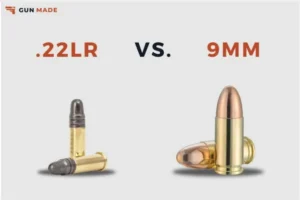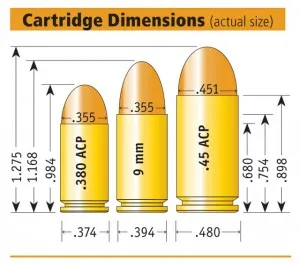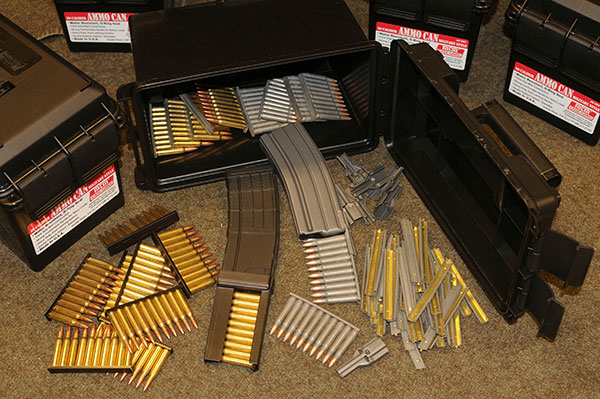One of the big questions new gun owners, specifically those who want to buy a gun for self-defense, ask is “What caliber gun and ammo should I use?”
Like anything else, there are several opinions, and it may get confusing. So, I’m going to do my best to simplify it for you so you can make an informed decision.
The most common pistol calibers that are used by both criminals and lawful gun owners are the .22 long rifle, and 9mm.
The .380ACP, and .45ACP are distant seconds as well as revolver calibers such as the .38 special, .357 and .44 magnum.
All these calibers have their pros and cons, and I’ll touch on the main ones.
I am expressing my opinion here and not making anyone who prefers one over the other wrong.

So, let’s begin with the .22 long rifle.
It is a great caliber for beginners learning how to shoot. It is a small round that produces a level of recoil that isn’t overwhelming. .22 caliber pistols are lighter and easier to manipulate, especially if you struggle to rack the slide and load the magazine. That’s important for building confidence early.
If you hunt for small game or vermin, this caliber is a good option. It will do the job without the mess.
It’s also very cheap. You can get a good quality box of 50 rounds online for $3–4 plus tax and shipping. At a gun store, the same box will be about $10 plus tax.
.22 caliber pistols experience a lot of malfunctions. Even if you know how to deal with those, they may still be more problematic to fix than more powerful calibers. That can pose a serious problem if a malfunction occurs when you’re fighting for your life.
Because of the small stature of the caliber, using it for self-defense has its limitations. For example, the bigger the assailant, the more rounds you may need to put it down or strike with a higher degree of accuracy to more sensitive areas.
Under the extreme stress of a violent attack, that requires a high level of training most gunowners don’t have, and highly trained gun owners will likely not use a .22 caliber pistol for self-defense anyway.
Also, in colder climates, where assailants may be more heavily dressed, a .22 caliber round’s efficacy may be further diminished.
Having a .22 caliber pistol is better than having nothing at all for sure. Most assailants will not know what caliber the pistol aiming at them is, and none of them want to be shot by ANY caliber. That’s probably the only thing I’ll agree with criminals on.
So, don’t be discouraged from using a .22 caliber. Just be aware of its strengths and weaknesses and be well trained with it.

The .380ACP (acp stands for automatic colt pistol) is about 2/3 of the recoil of a 9mm. The cartridge is a bit smaller, and so is the projectile that hits the target. So, it packs more punch than a .22 and, in my opinion, the minimum caliber I would consider for self-defense. If it’s good enough for James Bond, it merits consideration, don’t you think?
It’s a good caliber for smaller or weaker folks that may have trouble controlling the recoil and racking the slide of larger caliber pistols. Also, .380 caliber pistols are usually smaller and lighter, which makes them easier to conceal and carry.
More experienced and well-trained gun owners will rarely use a .380 caliber gun as their primary firearm. Also, .380 ammunition is more expensive, and because it is not as popular, in the event of an ammo shortage, it will be very difficult to find and very expensive.
The 9mm is the most popular, versatile, and readily available caliber. It is the most widely used for self-defense and a natural step up from the .380ACP in terms of recoil and potency.
It also comes with different levels of potency and different cartridge weights. This versatility helps to meet different objectives. For example, a law enforcement officer frequently fighting violent criminals may carry 9mm ammunition in her gun with more weight and potency than a civilian who’s just looking to carry a gun for protection or home defense.
9mm pistols come in a huge variety from micro compact to full size. Not every pistol can accommodate every 9mm potency. So, it is important to know your gun and match it with the right self-defense ammunition.
Under normal circumstances, 9mm ammunition is affordable and readily available. In a shortage, it will likely still be the most accessible but for a premium.
The .38 special revolver caliber would be similar in recoil and potency to the 9mm.
The last caliber I’ll touch on briefly is the .45ACP. It is larger and more potent than a 9mm and thus has more stopping power.
Because of its size, it is quite heavier, and magazines have less capacity. 45 caliber guns are larger and not as comfortable or easy to conceal. Therefore, many gun owners use them for home defense and carry a 9mm in public.
The .357 and .44 magnum revolver calibers are at or a step above the .45 caliber potency scale and are less commonly used, if at all, for concealed carry.
Be aware that all these calibers come in both practice and self-defense cartridges. Self-defense cartridges are more expensive.
Not all cartridges available in a given caliber perform the same way. Reliability and accuracy may differ from manufacturer to manufacturer.
It’s less detrimental when it comes to practice ammo you only use at the range. But when choosing self-defense ammunition, you ought to be more discerning because lives are on the line.
Even if you practice a lot at the range with practice ammo, make sure to shoot with your self-defense ammo too from time to time, because it’s very important to know how the gun and ammunition you trust with your life will perform should you have to use deadly force in self-defense.

